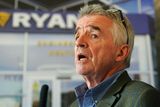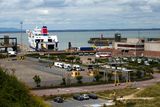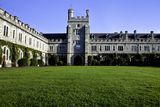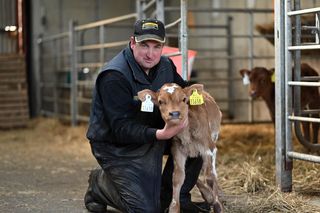Wizz Air chief: keeping costs lower than Ryanair and not 'alienating' passengers key
Wizz Air's ceo reveals how he's gone from departure lounge games to maximising the time he spends waiting at airports as he runs the burgeoning business which he founded after being in charge of Hungary's failed carrier Malev. He is confident that his airline's success in the central and eastern European market will continue as it focuses on consumer needs and invests in highly educated cabin crew at its Swiss HQ - and keeps fares as low as possible for passengers. He spoke to John Mulligan
Wizz Air ceo Jozsef Varadi speaking in Dublin
When Jozsef Varadi worked with consumer goods giant Procter and Gamble, he spent a lot of time flying.
The job may have changed, but he still spends a big chunk of his time in the air.
Hardly unexpected, but the problem is how to use the time productively, he admits, shunning a cup of coffee in a hotel next to Dublin's convention centre where one of two major aviation conferences is the capital this week is being held.
And Varadi has a confession to make.
"Five or six years ago I think I must have been one of the best in the world at Brick-Breaker," says the 51-year-old of the video game that was pre-loaded onto Blackberry devices.
"It's been one of the challenges. I am wasting so much time in airports and on aircraft. How do I use that time productively rather than just playing Brick-Breaker on a Blackberry?"
But the ceo of Wizz Air, which listed on the London Stock Exchange and a FTSE-250 company, has obviously not been whiling away all his downtime.
Having founded Wizz Air and launched it in 2004 (its first flight took off from Katowice in Poland), the carrier has grown to become the largest low-cost airline in central and eastern Europe (CEE), managing - for now at least - to stay ahead of Ryanair in many of the countries in which it has bases.
Wizz Air's revenue in its last financial year (to March 2016) was €1.42bn and it made a profit after tax of €223.9m.
The figures were up 16pc and 53pc respectively on the previous year. This financial year, it expects to deliver a pre-tax profit of between €245m and €255m.
With a fleet of 73 aircraft, Wizz Air serves about 130 airports in 38 countries. It carried 23 million passengers in the 2016 calendar year, which was a 19pc increase on 2015.
It should have about 100 aircraft in service by next year, and has an order of 110 Airbus A321neos that it will start taking delivery of in 2019.
While Ryanair boss Michael O'Leary has previously said that the Irish airline will become the biggest in CEE by 2018, Varadi insists that who's first or second doesn't matter.
"It's not the way to look at life," he says. "Ryanair has a particular style of business. They have a different level of financial support; they have a lot of aircraft [more than 300 at the moment].
"It's not the way we measure ourselves. As long as we are the lowest-cost producer in the industry, we are going to be fine competing with Ryanair and others."
Wizz Air is the biggest carrier in seven of 12 of the CEE markets it's in. Ryanair is the leader in three, including Poland, Lithuania and Slovakia.
For Varadi, the business is all about costs and keeping them low in order to deliver cheaper fares to consumers.
Its operating margin in its last financial year was 16.5pc compared to Ryanair's 22pc. Wizz's return on capital employed - a measure of profitability that shows how efficiently a company can generate profits from its employed capital - was 22.4pc in its last financial year, compared to Ryanair's 21.94pc.
He also learned lessons from Hungary's failed former flag carrier Malev, which he ran for two years from 2001 to 2003 after leaving Procter & Gamble. Malev collapsed in 2012, with most of its leased fleet parked up at Shannon Airport at the time.
"At Procter & Gamble, I learned how to think about consumers, and how to think about a business on a global or at least a European basis," he says.
"At Malev, I basically learned how not to do business. I saw that if I did everything just the total opposite to how they were doing it at Malev, I'd be fine."
Varadi says that Wizz Air has also managed to differentiate itself from Ryanair through its approach to customers, right from its launch over a decade ago. It wasn't until 2013 that Ryanair (28 years after its first flight) had an epiphany that putting customers at the centre of its business might actually be a good idea.
Interestingly, that campaign has been driven at Ryanair by Kenny Jacobs, whose background is also with consumer-focused businesses, such as Tesco and Moneysupermarket.
"We never found the need to alienate passengers," says Varadi, who concedes that Ryanair is a "great business" (Varadi was even flying back to Budapest this week with his rival).
Wizz Air's chairman is US aviation guru Bill Franke, whose Indigo Partners owns about 20pc of the airline's equity (Varadi owns about 4pc). Indigo's co-founder is US billionaire David Bonderman, the chairman of Ryanair.
"Ryanair helped us become the airline that we are," he adds. "But we are not Ryanair. We have always been much more focused on the needs of the consumer.
"We have been making significant efforts to become the home carrier for Hungarians, but also for Polish people to feel we are the Polish airline, for Romanians to feel we are theirs."
Varadi points out that 80pc of Wizz Air's cabin crew have a degree. "Their attitude to the job they do is significantly different to those in other airlines," he says.
What such highly-educated cabin crew says about job opportunities in the Hungarian economy is another thing (but unemployment there did hit a record low of 4.9pc last year).
And there's another thing. Wizz Air is tax resident in Switzerland (Varadi lives in Geneva). The guidance it has given the market is for an effective tax rate of about 10pc, but that's subject to profitability levels and other factors.
Varadi maintains that basing itself in Switzerland was necessary at the beginning to lure the kind of high-level and experienced senior talent the airline needed. Luring them to Budapest at the time might have been a tougher sell.
So, with Hungary having now cut its corporate tax rate to just 9pc, is it time for Wizz Air to make a beeline home?
"Tax is a consideration, but the other consideration is that we need to be able to attract the best talent available to the business. Taxation is never something you can bet on.
"One country may look very favourable today, but we don't know what may happen a few years down the line."
Indeed. Just look at the UK, headed for a hard Brexit.
But Varadi says he remains confident about the UK's economic outlook. Wizz Air has slowed its planned expansion in the UK, but is still growing there by about 16pc a year.
"You see other countries outside the European Union that are doing well, so there is life outside the EU. The UK will remain a very substantial part of Europe.
"There might be some bumps on the road, but I'm a big believer in the UK."
Join the Irish Independent WhatsApp channel
Stay up to date with all the latest news














